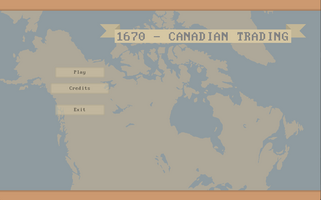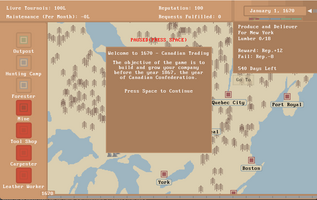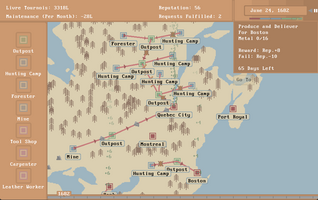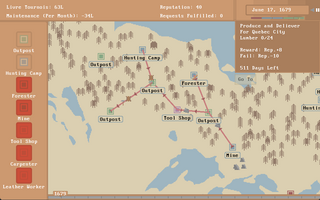1670 - Canadian Trading, What is it?




Hey there! So cool of you to check out my postmortem of 1670 - Canadian Trading. I am a Canadian developer based in Ontario primarily working with GameMaker: Studio 2. If you haven’t played 1670 Canadian Trading, I’d suggest doing so before reading this, but there is a lot of development commentary about the nature of making jams, so it’s not necessary.
What Is This Game? Where Did the Idea Come From?
I joined this jam because as much as I like game development, I also love history and storytelling! So where did the idea for the 17th century themed trading company game come from? Well, in Canada, our history is vast and interesting, however, I did not want to focus on war, politics, or any type of complex historical event that would require lots of research and development to simultaneously make it fun and accurate. Thus, I decided to focus on something that is, in my opinion, pretty integral to Canadian culture and the history of British North America(BNA). That is the history of the Hudson Bay Company. However, I wanted to make the name of the game ‘1670 - Canadian Trading’ ambiguous to allow the player to construct their own company in their head. This was great as I wanted to experiment for the first time in my life with the development of a Real-Time Strategy(RTS) game. Wanting to combine elements of puzzle-solving, resource management, and city building were all great ways to get the player involved in a hands-on experience that saw them building the world around them. Or, at least, that was the idea. This leads on to the next section…
My Challenges and Struggles
You see, GameMaker: Studio 2 isn’t exactly cut out to build complex GUI systems from the ground up, and although not impossible, building GUI different systems that would interact with each other. Primarily 3 systems had to interact with each other, time, resource production, and item storage. The game needed to speed up and slow down, keep track of resource production, and store items properly in an ordered and predictable manner.
This was not entirely hard, but I think what got me was my perfectionism. I wanted my code to execute perfectly and efficiently. Unfortunately, this got me into trouble as 48 hours before the deadline I had struggled to even make any type of gameplay. Quests/Missions of delivery would be programmed in a rush, this was reflected in what people had commented. People would say how much they enjoyed building production lines and optimizing resources, however, the mission system got in the way of many people enjoying the game in the beginning as they did not have enough money to even begin the game accurately. This would end in them having to restart every time and trying something new. A game-design-oopsie, if you would allow me to say. This was entirely my fault as I had not foreseen that it would be an issue because I was so focused on gameplay I didn’t have time to consider that strategy games are notoriously hard to design without player input.
ANDRONIKON NOTES:
If you are considering building a city-building/Factorio style game for a game jam, make sure you either have a clear vision of what you want your game to be and/or playtest a lot. I would not recommend making a city-building/factorio style game if the Jam is 48 hours or less, however, we game developers are a daring bunch, so go for it if you want to! The real issue is that you don’t have enough time to see if features help or hinder the gameplay.
I honestly think if I didn’t put missions, and instead put money goals, (ie. make 1,000,000£ by 1700), people would have had more fun.
Secondly, some players were just flat out confused on what to do, how they should build, how they should format, what does what, and how to do x, y, or z. This is the scourge of games like this. You need a good tutorial to teach gameplay mechanics. Originally, I had planned to add a separate staging ground where the player could learn the difference between workshops, producers, and city nodes. As well as, what resource nodes are and what you can and can’t do. This would have also been a good place to teach basic controls. Alas, I ran out of time, and small tooltips that show up when you create trading lines would have to suffice. All in all, creating a decent tutorial was practically impossible given the time I had.
Final Product
The final product, the game you see now, is something I am very proud of. Although it is not perfect, I did not know what I was doing. I am proud not of the game per se, but of how much I learned and was able to deliver in such a short amount of time. The only games I have made are shoot-em-ups, RPGs, and short puzzle games. My dream has always been to make an RTS game or a city builder. The fact that there are core gameplay mechanics like building, creating production lines, and time adjustment controls, makes me feel like I have accomplished plenty of new things in my game development journey.
A Short List of Things That Didn’t Make It In
- More dynamic camera
- Zooming and Panning
- Tutorial
- Statistics screen
- Upgrades
- More buildings
- Events
Criticism and Rooms For Improvement
- The beginning was too hard, people ran out of money and could not build any buildings to make a profit, those who did figure out how to make a profit only did after restarting a few times. I think I will change the way the early game is approached in the future.
- Sometimes unclear what to do or how to start, people didn’t understand what to do or how to play instead of playing blindly or just giving up. I think a tutorial and or more story setup would help guide players in the right direction. This would help to explain to confusing gameplay mechanics as the game expands.
- Running out of room eventually(can’t build upwards/only outwards). I need to add upgrades and ways to make the player build more efficient factories/production lines instead of bigger ones.
- No long-term gameplay. I want to add more gameplay, story, interactive elements, and dynamic missions that are more easily accessible.
Overall, the criticisms are very sound and are encouraging me to build onto this game and make it something more.
What Did I Learn? And What Can You Learn Too?
Firstly, a good question comes to mind after reading everything so far: what makes a good game jam game, or any game that you have to build quickly? I think what I’ve learned is that if you want to make a successful game jam you need to have a really clear vision of what you have to program so you don’t get lost in experimenting with something that doesn’t work and you need to understand that not everything you do will come out perfect or will get into the final product. At a certain point developing 1670 - Canadian Trading, I knew there were problems in the code, bugs, optimization issues, key features that wouldn’t make it in, and other quality of life features I wanted to add, but I had to decide what was necessary and push through until the end to finish it.
Secondly, is GUI hard, or is it? Another thing I want to address is whether making a GUI system is hard. I am more speaking to my fellow GameMaker: Studio 2 developers because unlike Unity or Godot, we have nothing. Every box, pop-up, GUI text, and button was programmed from scratch. Everything was coded in without any help. This means I had to know exactly what I wanted a button or text box to do, to look like, where to be placed, etc. I couldn’t just drag and drop it into the room and resize it to my liking. This system is horrible, it’s slow, exhausting, and prone to break.
GameMaker users have been waiting for a legitimate GUI system for a while. Although I may sound like I entirely hate it, it is very powerful if you know how to use it properly. The thing about GameMaker not having a pre-baked GUI system(ok, well it does, but nobody uses it because it is outdated and practically useless) is that I get complete control with everything. So to answer the question of whether GUI is hard for an engine that doesn’t have a GUI system is yes. However, it is not impossible and with time and experience, it can become very easy once you know what you are doing.
Lastly, is a strategy game too hard for a game jam? Even though I have been critical about this idea to make an RTS, I think it is possible if you have enough experience with debugging and making your code efficient. I’d honestly recommend switching to an engine like Godot or Unity if you aren’t using them because GameMaker might not be the best choice for a beginner. Not because GameMaker is hard to use, but because everything takes a long time. So for this last question that I had to answer in my journey, I will end with this. You have to ask yourself: How long will this take? Can I do it?
Conclusion
Finally, I’d like to just end with, honestly, I am a bit of a stickler for detail. If you feel like you want to embark on a crazy-ambitious project for a game jam. Go for it, that’s the beauty of the jam. It is about making things for the love of making them even if you know you might not be able to. So my grand conclusion to this wonderful experience with the “Historically Accurate Game Jam 5” is that this community is full of passionate individuals and I am proud to be a part of a community that inspires, teaches, and supports the growth of skills and people!
Files
Get 1670 - Canadian Trading
1670 - Canadian Trading
A game about trading furs and developing 17th-18th century New France into a bustling industry.
| Status | Released |
| Author | Andronikon |
| Genre | Simulation, Educational, Puzzle |

Leave a comment
Log in with itch.io to leave a comment.